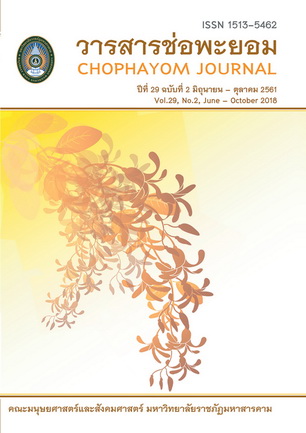Development model based on good governance principles of government officials in the Department of Audit, Ministry of Finance, Lao People's Democratic Republic
Keywords:
Good governance, Civil ServantsAbstract
The purposes of the current study were 1) to investigate factors affecting good governance development of government personnel working Supervision division, the Ministry of Finance, Lao PDR, 2) to develop a developing model of good governance for government personnel working in Supervision Department, the Ministry of Finance, Lao PDR, and 3) to implement the developed plan into the target area. The study was divided into 3 phases. The results of the study were revealed as follow. 1. Phase 1 aimed to investigate factors affecting good governance development of government personnel working Supervision division, the Ministry of Finance, Lao PDR. The data were collected from 400 samples with the stratified random sampling method. The hypothesis
was proved by the structural equation model (SEM) using LIREL and Person’s Correlation in data analysis. The instrument was a set of questionnaire, The result as follows. Study showed that the causal relationship model was related to empirical data. The casual factor included individual factor including 1) self-disciplinary; family factors including 1) family status and 2) economic status of the family; social factors including 1) media imitation. The casual factors directly affected the variables included the family factor with the coefficient of 0.43, and the indirect positive effect of family factors was at the coefficient level of .001. In addition, the overall positive effect of the family factor was found at the coefficient level of 0.41 which affected the development of good governance of the government personnel in the Supervision department. 2. The result of the development of a developing model of good governance for government personnel working in Supervision Department, the Ministry of Finance, Lao PDR from the target group of 20 experts, scholars, and accomplices selected by the purposive random sampling method using the result of the phase 1 as the model of the development in a focus group conference indicated 7 activities in the model including activities related to relationship development, spending planning, value of money, time spending planning, search of role model, spending for the greatest value, and morality of supervision. The result of the study was reviewed and brought about to the study in phase 3. 3. The result of the implementation and evaluation of the developed model in the target area having 40 government personnel in Supervision department, the Ministry of Finance, Vientiane as the participants selected by the purposive random sampling and providing the questionnaire data which were analyzed by a computer program calculating the Repeated Measure Multivariate Analysis of Variance: MANOVA found that the performances of the participants before and after the implementation of the developed model were significantly different at the statistical level of .05. It could be implied that actions in the developing model of good governance for government personnel working in Supervision Department resulted in more good governances of the personnel. It could also be implied that the personnel performed less corruptions, knew how to save, and used resources at the greatest value which was appropriate to their economic status.
Keywords : Good governance, Civil Servants




